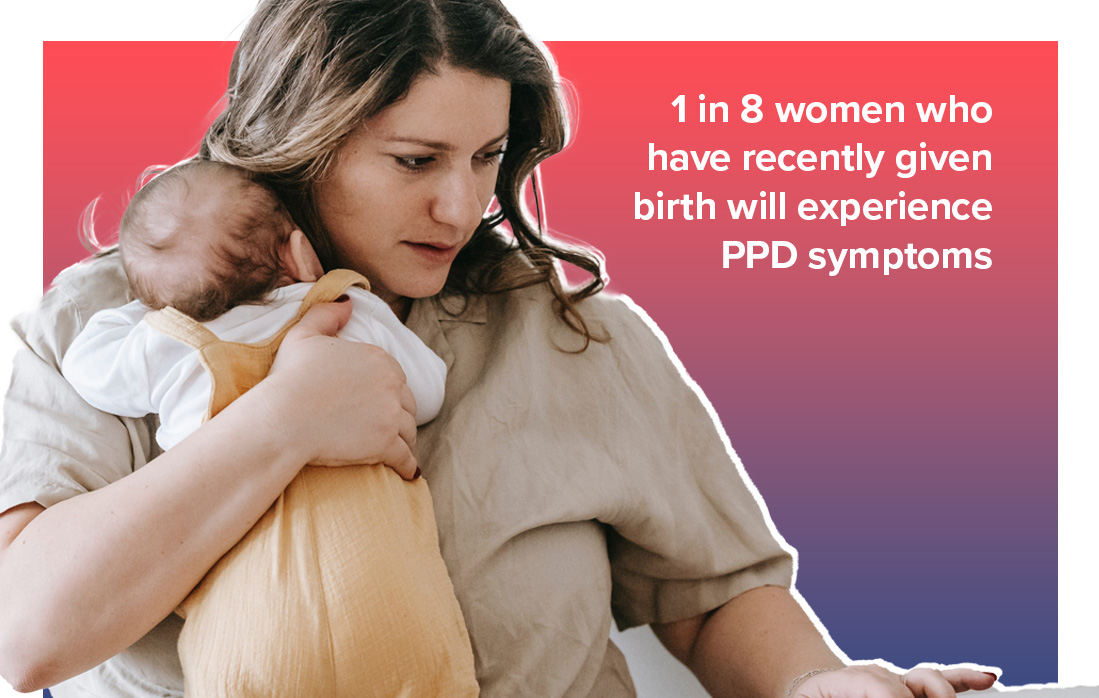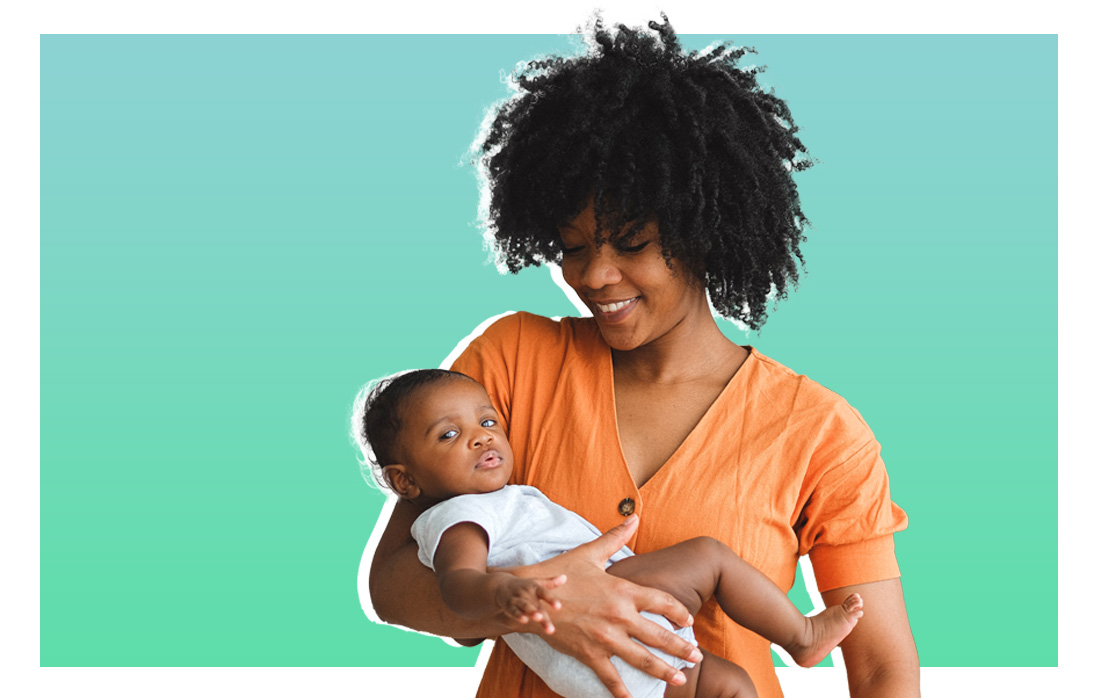Having a baby can be one of the most joyous moments in a parent’s life: After 9 months of waiting, that little bundle of joy is finally in their arms, and all eyes are on the baby. New mothers in particular might feel like they need to devote all of their attention to their newborn, but it’s important they pay attention to their own bodies and needs postpartum, as well. In the months right after birth, new mothers may be particularly vulnerable to changes that can affect their mental and physical health, including postpartum depression.

What is Postpartum Depression (PPD)?
Postpartum depression (PPD) is when women experience depressive symptoms shortly after giving birth. Though it can often be confused with the baby blues, postpartum depression is a long-term condition that requires treatment, while the baby blues are often short-lived with symptoms that fade on their own.
While it can be easy to assume “it can never happen to me,” 1 in 8 women who have recently given birth will experience PPD symptoms. Some women are at higher risk than others, including women who have:
- Experienced postpartum depression before
- Had a previous diagnosis of depression
- A family history of depression
- Significant life stressors
- A lack support from partner or family
- Challenges breastfeeding
Though PPD can be incredibly challenging, it’s a very common part of the post-birth experience for many. It’s important for new mothers to stay vigilant and talk to their doctor if they feel they might have postpartum depression.
The Relationship Between PPD and Sleep
Postpartum depression can impact many different areas in a mother’s life, including the amount and quality of sleep she may be getting. The relationship between sleep and PPD is bidirectional, too: Recent studies show that symptoms of insomnia and low sleep quality can be independently linked with greater symptoms of depression both throughout pregnancy and postpartum. Likewise, depression can lead to poor sleep quality and symptoms of insomnia, which may make it difficult for a new mother to determine the source of sleep problems or depressive symptoms. Because of this, it’s important for new mothers to prioritize their own rest as much as possible and to be in touch with their doctors if she is showing signs of PPD.
How Does Postpartum Depression Affect Sleep?
Postpartum depression can have a significant impact on sleep for women after birth.
Postpartum studies suggest that women with depressive symptoms experience poorer sleep quality, less total sleep time, take more time to fall asleep, and experience more sleep disturbances, while women without depressive symptoms sleep more efficiently and adjust to postpartum sleep disturbances more easily.
Women with postpartum depression typically experience poorer sleep quality than women without it, and that sleep quality can get even worse as PPD symptoms worsen. Oftentimes, women expect to feel fatigued and sleep deprived in the first few months after having a baby. And while some fatigue can be normal — or even a symptom of postpartum fatigue — it’s important that new mothers are paying attention to any other symptoms they experience to ensure they aren’t unknowingly struggling with PPD.
How Does Sleep Affect Postpartum Depression?
Just as PPD can affect sleep quality, the opposite is also possible. Sleep deprivation and poor sleep quality can both have an effect on PPD. One study found that women who experienced poor sleep efficiency (the ratio of total sleep time to time in bed) could be more likely to develop PPD or worsen their existing symptoms.
Another study demonstrated that sleep disturbances and poor subjective sleep quality (sleep variables such as total sleep time and time required to fall asleep measured by sleep diaries or post-sleep questionnaires) were associated with depression in postpartum. As new parents spend a great deal of their time waking up for feedings and trying to drift back to sleep before the next shift begins, mothers who have struggled with falling asleep in the past should be particularly aware of this possibility.

Causes, Symptoms & Treatments of Postpartum Depression
Nearly everything changes for a mother post-birth — their bodies, lifestyles, hormones, even their identities. And with so much changing at once, it’s a perfect storm for PPD. Understanding the causes and symptoms of PPD can protect a new mother in the event she develops PPD and needs to contact her doctor.
Symptoms of Postpartum Depression
Symptoms of PPD may include:
- Crying more often than usual
- Extreme mood changes
- Withdrawing from loved ones
- Over-attentiveness or withdrawing from your baby
- Exhaustion
- Fear of harming your newborn or yourself
- Feelings of guilt
- The baby blues
- Sleep disturbances
Symptoms may start as early as 2 weeks after birth, often peaking between 6 and 12 weeks and can last indefinitely if left untreated.
New mothers should also be aware that they may have Postpartum Fatigue (PPF) rather than PPD, too. PPF has some of the same root symptoms as PPD — decreased capacity for physical and mental activity, lack of energy, difficulty concentrating — but it is considered a temporary and unavoidable part of parenthood postpartum.
Causes of Postpartum Depression:
- Hormonal changes. Levels of estrogen and progesterone dip dramatically in the hours after childbirth, which can trigger depression in the same way regular hormone changes can cause mood swings during the menstrual cycle.
- History of depression. Women who have been diagnosed with depression at any point in the past, including during pregnancy, are more susceptible to developing PPD.
- Fatigue. As we mentioned earlier, fatigue can be a symptom of other conditions, or even a normal part of life shortly after birth, such as PPF. However, lasting fatigue can contribute to the worsening of PPD symptoms.
- Emotional factors. Pregnancy and birth are difficult for a variety of reasons, from the base level of exhaustion and strain on a pregnant person’s body, to additional health complications that arise from being pregnant or additional stress surrounding the wellbeing of the baby in utero and post-birth. These factors can contribute to sadness, anger, guilt and frustration in new parents, and can also impact PPD in conjunction with other causes.
- Lifestyle. Having a new baby can be difficult, both physically and emotionally. If new mothers aren’t receiving adequate support or are experiencing other difficult life events in conjunction to bringing their newborn home, the risk of PPD can increase greatly. PPD may also be linked to socio-economic status, history of emotional abuse and present/lack of support system.
Treatments for Postpartum Depression
Though PPD can be a significant challenge for new mothers, there is hope — postpartum depression can be treated in a variety of ways, including:
- Therapy. From talk therapy with a counselor to unpack all the changes in a new parent’s life to hormone therapy with a professional post-birth, there are many forms of therapy that can help those suffering from PPD.
- Support groups. Though people suffering with PPD can often feel isolated and alone, they aren’t — PPD is incredibly common, and finding a support group with others who have suffered from postpartum depression can make a significant difference.
- Take care of yourself. While a new parent’s instinct is often to pour all of their energy and effort into the new baby, it’s important to take time for yourself, too. Try to eat nutritious foods, take time to exercise, practice self care, and rest.
- Medication. Medication can help a new mother struggling with PPD as well — talk to your doctor to decide which one is best for you.
- Talk to your doctor. You don’t need to suffer in silence — if you feel you have symptoms of PPD, talk to your doctor and come up with a treatment plan to help you prioritize your mental well being as you adjust to parenthood.

9 Common Myths About Postpartum Depression
There are many myths out there surround postpartum depression that are important to debunk to prevent new mothers from suffering unnecessarily. Popular myths include:
Myth #1: It’s just the baby blues. The baby blues and PPD are completely different conditions with a different set of symptoms—don’t dismiss or downplay your symptoms or suffering!
Myth #2: PPD will go away on its own. Though postpartum depression is treatable, it won’t go away if it’s ignored or left unchecked. Your doctor can help you come up with the best treatment plan for you.
Myth #3: PPD can be prevented if I just…. There’s nothing a new parent can do to stave off PPD — the best thing to do is be on the lookout for symptoms and ready to talk to your doctor to come up with a treatment plan if you’re affected.
Myth #4: Postpartum depression occurs right after birth. Though PPD can occasionally kick in during the pregnancy or a year after birth, most of the time symptoms begin manifesting a few months after childbirth.
Myth #5: PPD only affects women. Though women are most commonly impacted by PPD, up to 10% of fathers get postpartum depression (also known as paternal postnatal depression), with those whose partners have PPD at a higher risk. It most commonly occurs 3-6 months after the baby’s birth.
Myth #6: Women with PPD may harm or kill their babies. This is false, and the myth likely stems from PPD being mixed up with postpartum psychosis, a serious and extremely rare disorder. Symptoms of postpartum psychosis include confusion, disorientation and delusions.
Myth #7: Women with PPD cry all the time. Emotions for women with PPD run the gamut and are certainly not limited to sadness. While some women may be tearful due to PPD, many others may instead feel numb, angry, irritable, or impatient.
Myth #8: Women with PPD don’t love their babies. PPD is a medical condition that does not reflect a mother’s love for her child. While PPD may affect a mother’s ability to bond with her baby while she experiences symptoms, it is not an active choice or a reflection of how she feels about her infant.
Myth #9: If a women didn’t have PPD with her first child, she’ll never have it. While women who have had PPD in the past may have a higher risk of developing it again, postpartum depression can happen after the birth of any baby, regardless of a mother’s history.
Tips for Improving Postpartum Sleep
Though getting some shut eye can be difficult after bringing a newborn home, there are some steps new parents can take to make sure they’re getting as much rest as possible, including:
Sleep when the baby sleeps and catch up on lost sleep when you can
Opportunities to sleep with a newborn are precious, so take them when you can, including naps throughout the day. Likewise, if you have a family member or friend around who can keep an eye on the baby, and other children that you may have, to give you a break, take the opportunity to catch up on rest if possible.
Practice good sleep hygiene
Good sleep hygiene can correct habits that contribute to poor quality sleep at any phase of a person’s life, and post pregnancy is no exception. Some common practices for good sleep hygiene include:
- Avoiding heavy meals before bed
- Regular sleep and wake times (as much as possible with a baby!)
- Avoiding caffeine and alcohol in the hours leading up to bedtime
- Creating a cool and dark sleep environment
- Reserving the bed for sleep and sex
- Exercising regularly in the morning or afternoon (avoid exercise at least 4 hours before bedtime)
- Keep dim light when feeding or changing the baby in the middle of the night
- Increase exposure to bright light in the morning
Share the workload
If you have a partner who can help you, make sure you aren’t bearing the brunt of childcare duties by yourself, and be sure to accept help if friends and family offer. New parents might feel like they have to have parenthood figured out by themselves, but they say “it takes a village” for a reason!
Be patient with yourself
Adapting to parenthood — or bringing another newborn into your brood — is a steep adjustment. Give yourself some grace as you learn and adjust to your new lifestyle with your baby.
Last Word From Sleepopolis
Adapting to life postpartum can be a challenge, and PPD doesn’t make it any easier. While your instinct might be to devote all of your time to your new baby, it’s also important to prioritize your own mental and physical wellbeing. If you find yourself exhibiting symptoms of PPD, don’t hesitate to reach out to your doctor to come up with a treatment plan that’s right for you.



























